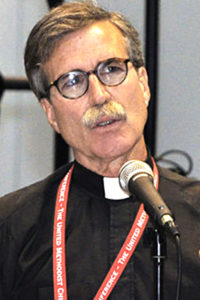AN OPEN LETTER: TO THE CARDINALS OF THE CONCLAVE FROM A PROTESTANT PASTOR
Dear Cardinals:
Easter Season grace and peace to you and yours. With the help of God the Father, who displayed glorious power and good providence in raising His Son Jesus Christ from the dead, you can approach your duty of electing the next pope not with anxiety, not with fear, but with faith. Before and during this conclave, I will pray for you, for your faith, and for your service, which flows from faith.
The momentous task before you demands democratic participation—that is, listening and questioning, proposing and persuading, deliberating and decision-making—and voting. Through it all, you must be sensitive to God’s will and leading. May God the Spirit bless you with patience and perseverance to fully and faithfully participate in the election of the next pope.
In our time, leaders speak of “values” (not Virtues), “my truth” (not Truth), “my faith” (not the Faith), “my interpretation of Scripture” (not Scripture). Moral boundaries are crossed. Obliterated. Choice dominates. Institutions erode. The world appears to be “liquefying.” Of course that is just the world being the world; but our present situation seems especially dire. The world is challenging and jostling the Church; so much so that today every communion has proponents who favor jettisoning biological and moral, philosophical and theological, truths. In recent decades, this has led to schism in many Protestant communions—most recently, in my own, The United Methodist Church. Even some Roman Catholics are concerned that schism may be coming their way.
Now, and in the days to come, I urge you, as brothers in Christ, to consider your task from an ecumenical perspective. The next pope will have a profound impact on Protestants. That lesson was learned by this Protestant pastor during the pontificates of recent popes. Speaking the Word of God on the strong foundation of Scripture and Tradition, they blazed trails through ideological and secularistic thickets over which Protestant pastors and laity could then travel. When a pope challenged the latest philosophical invention or moral innovation to violate ancient teaching—and provided the philosophical and theological basis for his challenge—countless Protestants heard his words (thanks to the miracles of the modern media) and were encouraged to be more faithful to Gospel truth.
For decades, popes have taught this United Methodist in several callings. Married to Marsha for over 50 years. Blessed with four children. Ordained an elder in The United Methodist Church. Pastored congregations for over 35 years. Committed to Christian unity as the will of God. Led the mission of Lifewatch, a quarterly newsletter dedicated to witnessing to Christ’s Lordship over His Church, defending the God-given gift of marriage, and protecting the God-given lives of vulnerable people (especially unborn children and their mothers).
When the pope speaks, Protestants hear. When the pope preaches, Protestants listen. When the pope teaches (e.g., through encyclicals), Protestants learn. When the pope travels, Protestants follow and pay attention. When the pope’s ministry clearly and persuasively serves Christian truth, as articulated by the Roman Catholic Church, Protestants are more fully grounded in the apostolic faith. On the other hand, when the pope’s ministry seems out of balance or too opinionated, Protestants become less sure of, and less committed to, the apostolic faith.
Fearing the judgments of this world, and of some church leaders, too many Protestants routinely say, “We can’t talk about that . . .” We can’t talk about church leaders making off-base pronouncements. That would be disrespectful. We can’t talk about what the Bible says about marriage. That would be hurtful to some. We can’t talk about gender ideology. That would embarrass families in our congregation. We can’t talk about life and abortion. That would be divisive and political. A bold, articulate pope—one who is true to the Roman Catholic faith, who teaches and preaches in ways that help clergy and laity to think and live as Christians—will prepare and empower Protestant clergy and laity to address those “We can’t talk about that” subjects.
The pope who is elected by you will have an impact on many difficult, significant conversations among Protestants in church parking lots and around kitchen tables. Those conversations, when Christ is honored, can lead people to life-restoring water, and away from life-denying deserts. Again, yours is a momentous task.
This is my challenge to you: Elect a pope who is strong and clear in teaching and preaching the Word of God—that is, what the Roman Catholic Church holds to be revealed and true. In the days to come, be not afraid. Be especially faithful to Christ, for the sake of the Roman Catholic Church—and the whole Church.
In Christ,
(Rev.) Paul T. Stallsworth
Wilson, NC
USA
—Rev. Stallsworth is an elder in The United Methodist Church and a member of the North Carolina Conference. A retired pastor, he now edits Lifewatch, a quarterly newsletter that proposes the Gospel of Life to Methodists and others. With his wife Marsha, he lives in Wilson, NC.










